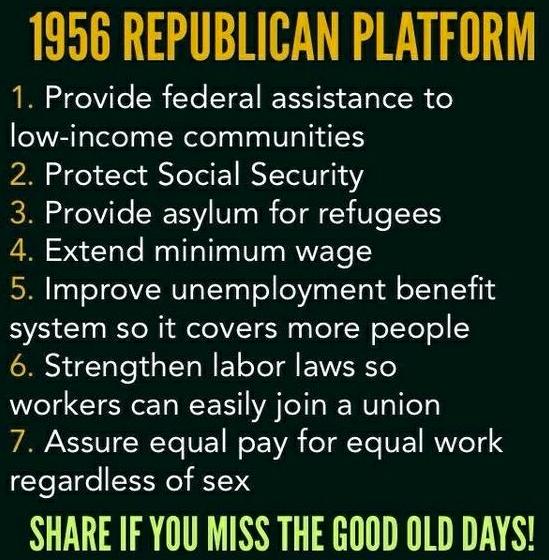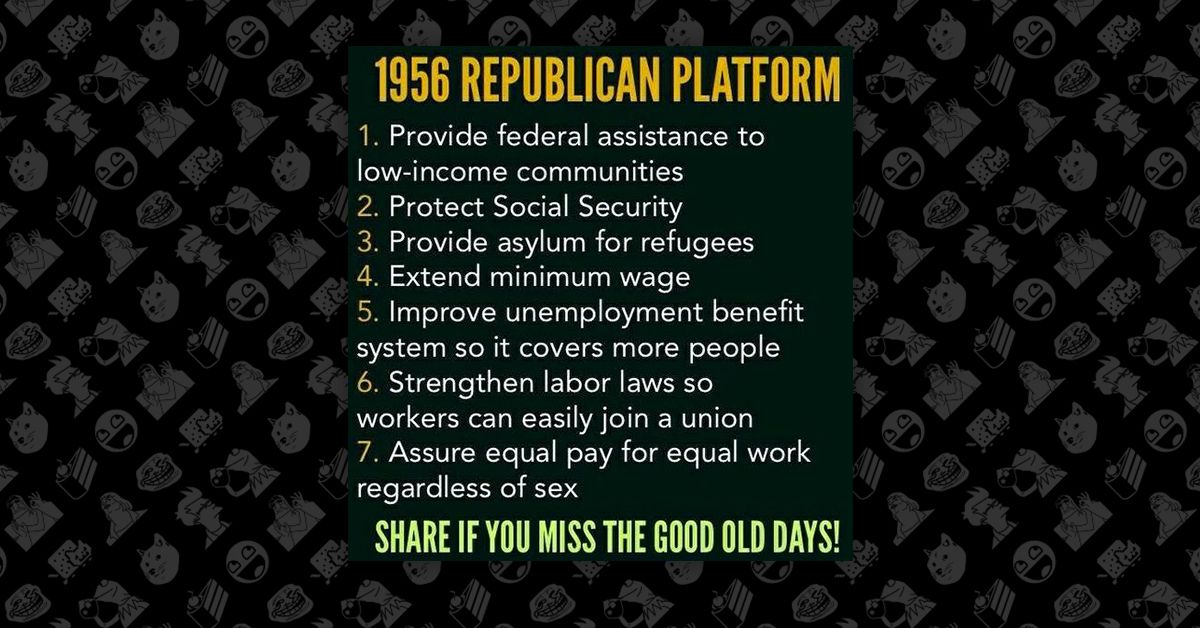A few weeks before the 2012 U.S. presidential election, a meme began to circulate on social media suggesting the 1956 Republican platform included policies that would more closely match those of progressives in later years:

The tenets listed in the 1956 Republican platform graphic certainly deviate from many of the GOP's current party lines, but were the following cited planks notably different six decades ago?
- Provide federal assistance to low-income communities
- Protect Social Security
- Provide asylum for refugees
- Extend minimum wage
- Improve unemployment benefit system so it covers more people
- Strengthen labor laws so workers can more easily join a union
- Assure equal pay for equal work regardless of sex
It's difficult to make a direct comparison for a few reasons. One is that the Republican Party's national platform is not necessarily the same as the issues espoused by individual candidates at the federal, state, or local levels. In recent years, the advent of social media has enabled candidates and political organizations to push individually important agendas that may not hew to the party's overall national platform.
Another issue is defining what the party's platform is at any given time. The most recent available Republican Party platform dated to 2012, during the campaign of Mitt Romney. Not all issues addressed in the graphic above were directly mentioned or comparably referenced in the 2012 platform, and individual Republican Party members who have made statements about platform issues since then do not necessarily speak for the GOP at large.
The image displayed above first points to assistance for "low-income communities," language that does not specifically appear in the 1956 Republican platform. Under the heading of "Labor," the original document supported (to a degree) several of the positions summarized in the graphic in respect to minimum wage laws, unemployment assistance, and equal pay irrespective of gender:
The Eisenhower Administration will continue to fight for dynamic and progressive programs which, among other things, will:Stimulate improved job safety of our workers, through assistance to the States, employees and employers;
Continue and further perfect its programs of assistance to the millions of workers with special employment problems, such as older workers, handicapped workers, members of minority groups, and migratory workers;
Strengthen and improve the Federal-State Employment Service and improve the effectiveness of the unemployment insurance system;
Protect by law, the assets of employee welfare and benefit plans so that workers who are the beneficiaries can be assured of their rightful benefits;
Assure equal pay for equal work regardless of Sex;
Clarify and strengthen the eight-hour laws for the benefit of workers who are subject to federal wage standards on Federal and Federally-assisted construction, and maintain and continue the vigorous administration of the Federal prevailing minimum wage law for public supply contracts;
Extend the protection of the Federal minimum wage laws to as many more workers as is possible and practicable;
Continue to fight for the elimination of discrimination in employment because of race, creed, color, national origin, ancestry or sex;
Provide assistance to improve the economic conditions of areas faced with persistent and substantial unemployment.
The quoted portion did not specify expanded access to unemployment insurance benefits. However, the introduction addressed matters of expanding that benefit, as well as Social Security and even health care. The word "Protect" did not appear in that bit, but it did state:
We are proud of and shall continue our far-reaching and sound advances in matters of basic human needs — expansion of social security — broadened coverage in unemployment insurance — improved housing — and better health protection for all our people. We are determined that our government remain warmly responsive to the urgent social and economic problems of our people.We shall continue to seek extension and perfection of a sound social security system.
On the matter of supporting and encouraging labor unions, the 1956 Republican platform stated that "workers have benefited by the progress which has been made in carrying out the programs and principles set forth in the 1952 Republican platform ... workers have gained and unions have grown in strength and responsibility, and have increased their membership by 2 millions." It pledged to:
Revise and improve the Taft-Hartley Act so as to protect more effectively the rights of labor unions, management, the individual worker, and the public. The protection of the right of workers to organize into unions and to bargain collectively is the firm and permanent policy of the Eisenhower Administration. In 1954, 1955 and again in 1956, President Eisenhower recommended constructive amendments to this Act. The Democrats in Congress have consistently blocked these needed changes by parliamentary maneuvers. The Republican Party pledges itself to overhaul and improve the Taft-Hartley Act along the lines of these recommendations.
By contrast, the 2012 Republican Party platform said of workers, unemployment insurance, and worker protections that:
The best jobs program is economic growth. We do not offer yet another made-in-Washington package of subsidies and spending to create temporary or artificial jobs. We want much more than that. We want a roaring job market to match a roaring economy. Instead, what this Administration has given us is 42 consecutive months of unemployment above 8 percent, the longest period of high unemployment since the Great Depression. Republicans will pursue free market policies that are the surest way to boost employment and create job growth and economic prosperity for all.In all the sections that follow, as well as elsewhere in this platform, we explain what must be done to achieve that goal. The tax system must be simplified. Government spending and regulation must be reined in. American companies must be more competitive in the world market, and we must be aggressive in promoting U.S. products abroad and securing open markets for them. A federal-State-private partnership must invest in the nation's infrastructure: roads, bridges, airports, ports, and water systems, among others. Federal training programs have to be overhauled and made relevant for the workplace of the twenty-first century. Potential employers need certainty and predictability for their hiring decisions, and the team of a Republican President and Congress will create the confidence that will get Americans back to work.
Unions were also addressed in the 2012 platform in a somewhat different manner:
We will restore the rule of law to labor law by blocking "card check," enacting the Secret Ballot Protection Act, enforcing the Hobbs Act against labor violence, and passing the Raise Act to allow all workers to receive well-earned raises without the approval of their union representative. We demand an end to the Project Labor Agreements; and we call for repeal of the Davis-Bacon Act, which costs the taxpayers billions of dollars annually in artificially high wages on government projects. We support the right of States to enact Right-to-Work laws and encourage them to do so to promote greater economic liberty. Ultimately, we support the enactment of a National Right-to-Work law to promote worker freedom and to promote greater economic liberty. We will aggressively enforce the recent decision by the Supreme Court barring the use of union dues for political purposes without the consent of the worker.
Republicans in 1956 appeared markedly softer on matters of immigration and asylum, as their platform explained:
The Republican Party supports an immigration policy which is in keeping with the traditions of America in providing a haven for oppressed peoples, and which is based on equality of treatment, freedom from implications of discrimination between racial, nationality and religious groups, and flexible enough to conform to changing needs and conditions.In that concept, this Republican Administration sponsored the Refugee Relief Act to provide asylum for thousands of refugees, expellees and displaced persons, and undertook in the face of Democrat opposition to correct the inequities in existing law and to bring our immigration policies in line with the dynamic needs of the country and principles of equity and justice.
We believe also that the Congress should consider the extension of the Refugee Relief Act of 1953 in resolving this difficult refugee problem which resulted from world conflict. To all this we give our wholehearted support.
In 2012, the GOP platform was slightly more stringent:
We recognize that for most of those seeking entry into this country, the lack of respect for the rule of law in their homelands has meant economic exploitation and political oppression by corrupt elites. In this country, the rule of law guarantees equal treatment to every individual, including more than one million immigrants to whom we grant permanent residence every year. That is why we oppose any form of amnesty for those who, by intentionally violating the law, disadvantage those who have obeyed it. Granting amnesty only rewards and encourages more law breaking. We support the mandatory use of the Systematic Alien Verification for Entitlements (S.A.V.E.) program — an internet-based system that verifies the lawful presence of applicants — prior to the granting of any State or federal government entitlements or IRS refunds. We insist upon enforcement at the workplace through verification systems so that jobs can be available to all legal workers. Use of the E-verify program — an internet-based system that verifies the employment authorization and identity of employees — must be made mandatory nationwide. State enforcement efforts in the workplace must be welcomed, not attacked. When Americans need jobs, it is absolutely essential that we protect them from illegal labor in the workplace. In addition, it is why we demand tough penalties for those who practice identity theft, deal in fraudulent documents, and traffic in human beings. It is why we support Republican legislation to give the Department of Homeland Security long-term detention authority to keep dangerous but undeportable aliens off our streets, expedite expulsion of criminal aliens, and make gang membership a deportable offense.
Social Security warranted a few mentions in the 2012 platform, most notably in this portion:
For much of the last century, an opposing view has dominated public policy where we have witnessed the expansion, centralization, and bureaucracy in an entitlement society. Government has lumbered on, stifling innovation, with no incentive for fundamental change, through antiquated programs begun generations ago and now ill-suited to present needs and future requirements. As a result, today's taxpayers - and future generations - face massive indebtedness, while Congressional Democrats and the current Administration block every attempt to turn things around. This man-made log-jam - the so-called stalemate in Washington - particularly affects the government's three largest programs, which have become central to the lives of untold millions of Americans: Medicare, Medicaid, and Social Security.
Among the remaining points of the graphic, gender pay discrepancy was not directly referenced in the 2012 platform.
While the two platforms from 1956 and 2012 may appear starkly different when compared side-by-side, one must also keep in mind that the Republican Party tenets referenced in this meme predate many of the issues American voters now feel are central to their lives 60 years on.

